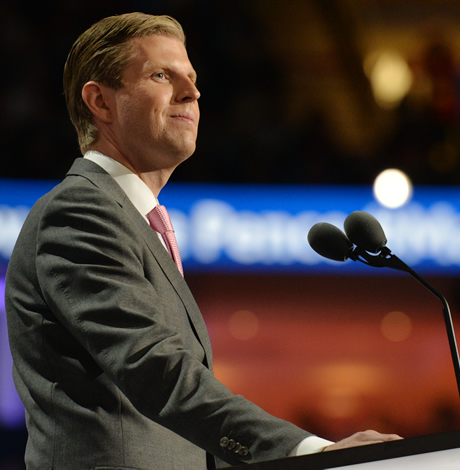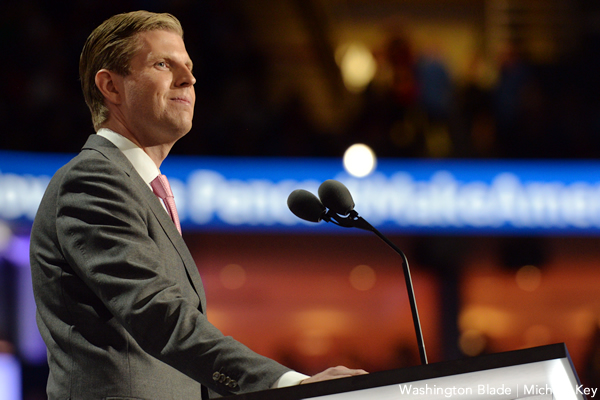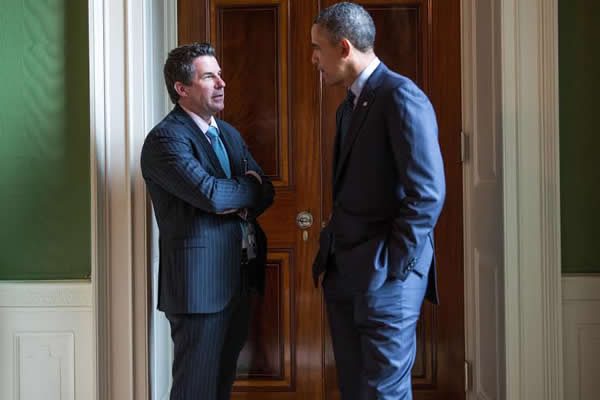Arts & Entertainment
Eric Trump insinuates Ellen DeGeneres is part of the ‘Deep State’
the second oldest son included Hillary Clinton, Barack Obama on the list


Eric Trump (Washington Blade photo by Michael Key)
Eric Trump raised eyebrows on Twitter when he suggested that daytime television host Ellen DeGeneres is a part of the “Deep State” conspiracy.
President Donald Trump’s second youngest son tweeted a screenshot of Twitter follow suggestions which included Hillary Clinton, Barack Obama and DeGeneres.
“Shocking… once again, here are the @Twitter “suggestions” of who I should follow. #DeepState,” Trump tweeted.
Shocking… once again, here are the @Twitter “suggestions” of who I should follow. #DeepState pic.twitter.com/6XYUS02j34
— Eric Trump (@EricTrump) January 3, 2018
The “Deep State” conspiracy theory claims that a shadow network within the government is working to undermine elected government officials. It’s unclear whether Trump was poking fun at the theory or is a believer but Twitter found his tweet entertaining especially since none of the three currently hold elective office or are government employees.
Hi Eric, I know you’re not the smart one, but Twitter’s algorithm looks at who you searched for most recently when making suggestions. It looks like you might have recently searched for a Democrat, buddy.
— Matt Clendineng (@mattclen2) January 3, 2018
You do realize none of the 3 recommends are employed by any state, deep or otherwise? In other news, there’s actually no mister under your bed either.
— Camille Kimball (@CamilleKimball) January 3, 2018
Yes, Ellen DeGeneres of the deep state. The very same.
— Advertise Here (@youradhereDMme) January 3, 2018
Not proud to admit this, but I would pay $20 to sit with Eric Trump for ten minutes and have him explain Ellen DeGeneres’ shadowy role in the Deep State.
— Tod Kelly (@RTodKelly) January 3, 2018
Apparently Ellen is part of the “Deep State. @TheEllenShow can you tell us where you were when Kennedy was assassinated? https://t.co/ntzggx88ij
— Mean Mr. Mustard (@HoratioMustard) January 3, 2018
Sports
‘Heated Rivalry’ stars to participate in Olympic torch relay
Games to take place next month in Italy

“Heated Rivalry” stars Hudson Williams and Connor Storrie will participate in the Olympic torch relay ahead of the 2026 Winter Olympics that will take place next month in Italy.
HBO Max, which distributes “Heated Rivalry” in the U.S., made the announcement on Thursday in a press release.
The games will take place in Milan and Cortina from Feb. 6-22. The HBO Max announcement did not specifically say when Williams and Storrie will participate in the torch relay.
Bars & Parties
Here’s where to watch ‘RuPaul’s Drag Race’ with fellow fans
Entertainers TrevHER and Grey host event with live performance

Spark Social Events will host “Ru Paul’s Drag Race S18 Watch Party Hosted by Local Drag Queens” on Friday, Jan. 23 at 8 p.m.
Drag entertainers TrevHER and Grey will provide commentary and make live predictions on who’s staying and who’s going home. Stick around after the show for a live drag performance. The watch party will take place on a heated outdoor patio and cozy indoor space.
This event is free and more details are available on Eventbrite.

The DC Center is hosting a watch party for an episode of the 10th and final season of “Queer Eye,” which was filmed in D.C. The screening will be held on Friday, Jan. 23 from 5:30-7:30 p.m. at the Center.
The screening will last 45-55 minutes, with community time both before and after the episode. Drinks and snacks will be provided and organizers promise a “surprise or two.” For information on tickets, visit the DC Center’s website.
-

 Virginia5 days ago
Virginia5 days agoTwo gay candidates running in ‘firehouse’ Va. House of Delegates primary in Alexandria
-

 Photos5 days ago
Photos5 days agoPHOTOS: Mr. Mid-Atlantic Leather 2026
-

 Congress5 days ago
Congress5 days agoMcBride, other US lawmakers travel to Denmark
-

 The White House4 days ago
The White House4 days agoA full year of Trump and LGBTQ rights: all that’s been lost


















